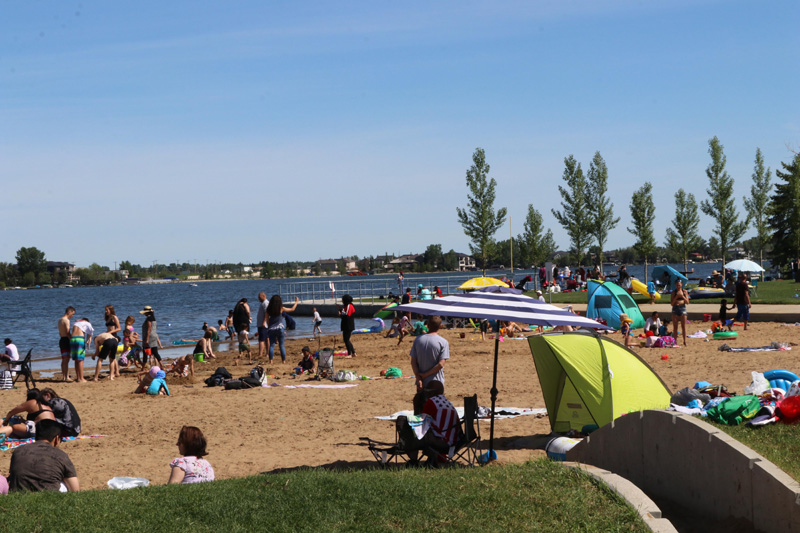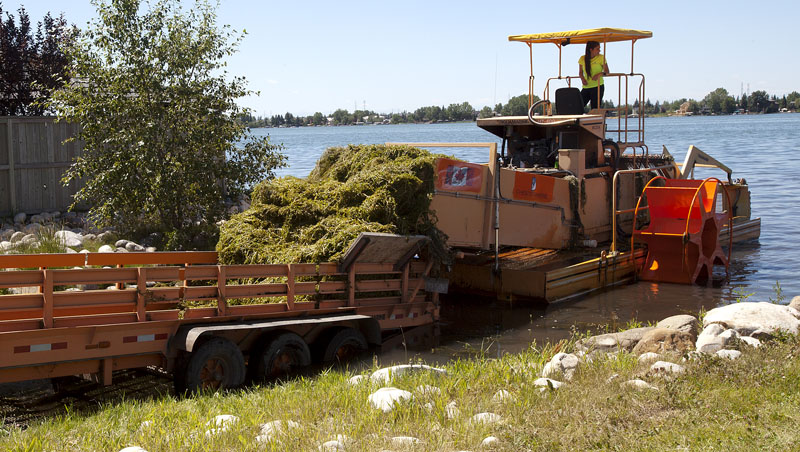At the July 28 Regular Meeting of Council, the Chestermere City Council passed a bylaw which will require non-Chestermere residents to pay an admission fee to use the beaches.
“Our main goal for 2020 is to keep people safe,” said Mayor Marshall Chalmers.
“We know that implementing capacity limits is the best way to ensure all beachgoers can have a safe and fun experience, but adding fencing and security is not free. As Chestermere residents already pay for the maintenance of the beaches, adding an admission fee for those who do not live in our community will help to offset the costs of keeping visitors safe during this global pandemic,” he said.
Beach visitors are required to pay a fee of $15 per person over 15 years of age, $5 per person between three and 14 years of age, and infants under three years of age are free. A family pass, of two adults and three youth is also available for $40.
“This is a fee to be charged for daily admission to the controlled access and clearly marked beaches. There is no charge for parking, this is something we believe we need to address with the Chestermere Regional Community Association (CRCA), said the Chief Administrative Officer (CAO), Bernie Morton.
There will be seven different coloured wristbands that will be issued for each day of the week.
For residents, there will be no charge to use the beach. However, they are required to also wear a wristband and provide documentation for proof of residency.
“This bylaw will be in effect for the remainder of 2020,” Chalmers said.
Adding, “At the end of this year, we will review its effectiveness and need for the future. That way, we can ensure we are still following the best ways to keep our residents and visitors safe, even as they enjoy our city.”
In the spring, the Chestermere Emergency Management Agency (CHEMA) worked with Alberta Health Services (AHS), the ministry of health, provincial operations centre, provincial and federal officials, and the Chief Medical Officer of Health Dr. Deena Hinshaw on pandemic management.
To be proactive, CHEMA requested a guidance document related to safe beach use, as other beach communities have faced challenges such as overcrowding and non-compliance with provincial health orders.
Not only did the document received state businesses must use increased sanitization to limit the transmission of COVID-19 to attendees, but clients must practice physical distancing and increased hygiene.
“All visitors to beaches must maintain a distance of two metres from others who are not in the same household or cohort,” Morton said.
“The document also states we must determine a reasonable capacity for the beach and recreational area, which will allow for adequate physical distancing,” he said.
Adding, “The capacity needs to be determined, monitored and adjusted accordingly based on observations, and we should implement measures for overcrowding.”
It was determined the maximum limit at Anniversary Park is 615 people, with 115 people on the beach, the maximum limit at Cove Beach is 205 people with 39 people on the beach, and the maximum at Sunset Park is 483 people.
If overcrowding continues to be a problem, the city may further limit or close the beaches.
The document also gave recommendations for beach communities to address overcrowding challenges such as limiting parking spaces, allowing access to beaches by reservation only, limiting beach access, and installing physical barriers to prevent uncontrolled access.
In response to the document, and to address overcrowding of beaches, non-compliance of public health protocols, and data showing a significant number of beach users being non-Chestermere residents, the city has implemented the recommended measures.
“These measures do not come without a financial impact to the community, one that is unbudgeted,” Morton said.
“This bylaw is directly a result of extraordinary costs attributed to COVID-19 safe practices and public health measures,” he said.
“This measure is designed to specifically address COVID,” he added. “Communities across Canada are limiting capacity, charging for parking where they once did not, increasing parking fees to help offset costs, charging for beach use, increasing police, and enforcing presence.”
Currently, the Parks and Recreation team is working on a plan to supervise Anniversary Park and Cove Beach while reviewing suggested fees.
“We’re looking at the revenue and trying to come up with a rough estimate of what we would be bringing in over the summer,” said City Director of Community Operations, Kathy Russell.
“The total revenue projection is approximately $34,000 to the end of the season. If we look at the expenses related to Anniversary Park and Cove Beach, we’re anticipating costs about $48,000,” she said.
The costs are primarily wages and security costs, with the remainder being for supplies, materials, and additional signage.
“We’re anticipating a loss of about $14,000 for the season,” Russell said.
The city now has security for Fridays, Saturdays, and Sundays. However, additional seasonal staff may be required Monday to Thursday to ensure capacity limits are followed.
“For those who are thinking it’s a cash grab, it’s not. It’s designed to charge reasonable and fair fees to non-residents, and purely for the purposes to try and offset some of these particular costs,” Morton said.
If the weather is poor, or there is low occupancy at the beach, the new measures will not be implemented.
“We’ll simply take down the payment in effect sign, and the security guards will be asked to leave. This is really designed for those times when the beaches are very busy,” Morton said.
“The only other answer, which some members of our public have supported is to close the beach altogether. We’re trying to find a way where we can keep the beaches safely open, recuperate some of those costs and not move towards the extraordinary measure,” he said.
Currently, there is no long-term solution to beach overcrowding. However, Morton is hopeful to develop one with the community and CRCA in mind.







